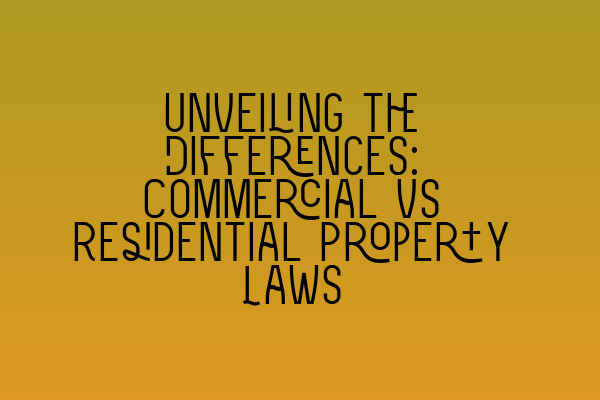Unveiling the Differences: Commercial vs Residential Property Laws
Are you considering investing in property? Whether you’re an experienced investor or a first-time buyer, it’s essential to understand the differences between commercial and residential property laws. These differences can significantly impact your rights, obligations, and potential risks. In this blog post, we’ll delve into the nuances of commercial and residential property laws, so you can make informed decisions and navigate the real estate industry with confidence.
Commercial Property Laws: A Closer Look
Commercial property encompasses properties intended for business purposes or income generation. This can include office buildings, retail stores, warehouses, and industrial spaces. Commercial property laws are primarily concerned with regulating transactions and leases involving these properties.
Leases: Commercial leases are typically long-term and more complex compared to residential leases. They often involve negotiations of terms such as rent, maintenance obligations, insurance requirements, and restrictions on alterations or subleasing. Commercial lease agreements also cover issues such as rent reviews, lease renewals, and dispute resolution processes.
Landlord and Tenant Act: The Landlord and Tenant Act governs the relationship between landlords and commercial tenants. It establishes minimum statutory requirements regarding lease terms and covenants, repairs, and access rights. Unlike residential property laws, commercial tenants generally have fewer legal protections, given that commercial leases are often subject to negotiation and tailored to specific business needs.
Planning Permission: When dealing with commercial property, obtaining planning permission is crucial. The local authorities play an essential role in regulating the use, development, and changes in commercial properties. Planning permission ensures that developments align with zoning regulations and any potential environmental implications are addressed.
Taxes: Commercial properties are subject to various taxes, such as business rates and value-added tax (VAT). Business rates are a local tax on commercial properties, while VAT may apply to the sale or rental of certain commercial properties. These tax considerations make commercial property investment more complex and require careful financial planning.
Residential Property Laws: An In-depth Analysis
Residential property refers to properties primarily intended for personal occupation or as a home. Residential property laws protect the rights of homeowners and tenants while ensuring safe and habitable living conditions.
Tenancy Agreements: Residential tenancy agreements typically follow a standard format, providing clarity and consistency for both landlords and tenants. These agreements cover rent, tenancy duration, deposit protection, repairs and maintenance responsibilities, and termination procedures. In some cases, additional regulations may be applicable, such as House in Multiple Occupation (HMO) licensing for certain types of rented accommodation.
Landlord’s Responsibilities: Residential landlords have specific legal obligations towards their tenants. These include providing a safe and habitable living environment, maintaining essential services (like heating and water), and adhering to tenancy deposit protection regulations. The law also outlines processes for rent increases, eviction proceedings, and dispute resolution in residential properties.
Leasehold and Freehold: Residential properties can be leasehold or freehold. Leasehold means that you have ownership of the property for a fixed term, subject to payment of ground rent and compliance with lease conditions. Freehold, on the other hand, grants you complete ownership of the property and the land it sits on. Understanding these terms is crucial when purchasing a residential property.
Mortgages: Financing a residential property typically involves mortgage agreements. Lenders assess factors like creditworthiness, income stability, and property valuation to determine the terms and conditions of the mortgage loan. Residential mortgage repayment periods can span several years, and failure to meet the agreed-upon terms can result in foreclosure.
Conclusion: Navigating the Legal Landscape
Understanding the differences between commercial and residential property laws is paramount when venturing into the real estate market. Commercial property laws focus on lease agreements, planning permission, and tax considerations, while residential property laws emphasize tenancy agreements, landlord responsibilities, and ownership types.
At SQE Property Law & Land Law, our team of expert solicitors is well-versed in both commercial and residential property laws. We can provide tailored legal advice, handle property transactions, and ensure your interests are protected throughout the process.
Contact us today to benefit from our vast knowledge and experience in property law. Whether you’re buying a commercial property or investing in a residential property, we’re here to guide you every step of the way.
